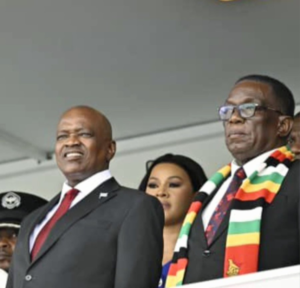ZIMBABWE ELECTIONS COMMISSION CAUGHT IN TENDER SCANDAL MAELSTROM

The Zimbabwe Electoral Commission (ZEC) finds itself embroiled in an escalating controversy over a secretive election tender, exposing deep-seated corruption at the heart of its operations. Documents obtained and verified by The NewsHawks have unraveled a series of clandestine meetings and financial dealings that contradict the official narratives presented by ZEC, particularly in a state-controlled narrative published by the Sunday Mail.
The scandal initially unfolded with ZEC Chairperson Priscilla Chigumba, alongside prominent figures such as Wicknell Chivayo and Moses Mpofu, visiting Ren-Form – a company that secretly awarded an election material tender on February 2, 2023. This visit marked the commencement of an opaque agreement that was orchestrated far from the public eye, including several meetings at Chigumba’s Greendale home in Harare.
Subsequent to these covert preparations, Ren-Form cemented its contract with Better Brands Security (Pvt) Ltd, owned by Pedzisayi “Scott” Sakupwanya, a noted gold baron, on February 13. This agreement was in place well before ZEC initiated its so-called official tender process, which documents and timelines reveal as nothing more than a procedural facade.
The timeline of events indicates that by the time ZEC’s official delegation made their trip to South Africa for engagements from April 16 through June 27, the deal had not only been sealed but was actively in operation with financial transactions already underway. Remarkably, the first of these payments was processed before the Easter holidays on March 31, predating the delegation’s negotiations in April.
In a revealing audio note, Chivayo discloses receiving a US$1 million payment – the smallest in a series of transfers intended for distribution among the key players involved in the deal. The division of these funds was meticulously planned: Sakupwanya received US$350,000; Chivayo, Mpofu, and Mike Chimombe each took US$150,000; with “Moms vaya” (Chigumba) and “DG” (CIO boss Isaac Moyo) getting US$100,000 each. This payout was designed to ensure a prosperous Easter holiday for the beneficiaries, with the promise of more substantial amounts to follow.
The complicity of high-level officials, including Chief Secretary to Cabinet Martin Rushwaya and the Director-General of the Central Intelligence Organisation, Isaac Moyo, further complicates the scandal. These individuals are not only close allies of President Emmerson Mnangagwa but appear to be integral to the coordination of the deal and its subsequent payments, implicating the highest levels of government.
This scandal has done more than just tarnish the reputation of the Zimbabwe Electoral Commission; it has exposed a web of corruption that extends through the echelons of power, involving significant sums of money and a number of Mnangagwa’s closest associates and cronies. The unfolding situation poses serious questions about the integrity of electoral processes in Zimbabwe, calling into question the legitimacy of the mechanisms supposed to safeguard democracy in the nation. As the details continue to surface, the scandal serves as a stark reminder of the challenges that lie in the path of achieving transparency and accountability in Zimbabwe’s political and electoral systems.



